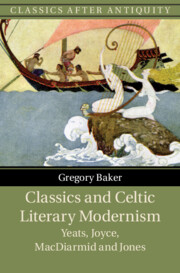Acknowledgments
I am indebted to many who have helped me bring this book to life. Along the way my research has been generously supported by involvement with the Modernist Studies Association, the American Comparative Literature Association, the American Conference for Irish Studies and the Association of Literary Scholars, Critics and Writers; with Brown University, the Graduate School of Arts and Sciences and the departments of Classics, Comparative Literature and English; and with the Catholic University of America, especially the English department. Thanks are due also to the staff of the Rockefeller Library at Brown University, as well as the staff at the National Library of Wales, Aberystwyth; the National Library of Scotland, Edinburgh; the National Library of Ireland, Dublin; the British Library; and the Burns Library of Boston College. Without their help many essential pieces of scholarly interest would have passed unnoticed.
I am grateful to the trustees of the David Jones Estate for allowing me to publish excerpts from the correspondence of David Jones. Éditions Gallimard have also generously permitted me use of René Char’s poetry for the epigraph of this book. I thank also the publishers at Bloomsbury Academic who granted me permission to reprint the parts of Chapter 3 that originally appeared in The Classics in Modernist Translation (2019).
All intellectual endeavors, I believe, are enmeshed in a complex web of influence, criticism and creativity. Over the last years I feel fortunate to have been caught, productively, in such a nexus – in conversations with scholars whose work and encouragement have helped me deepen my own research. In particular, I thank Fran Brearton, Gregory Castle, Thomas Dilworth, Leah Culligan Flack, Eamon Grennan, Miranda Hickman, Lynn Kozak, Florence Impens, Peter Liebregts, the late Margery Palmer McCulloch, Fearghal McGarry, Salvatore Pappalardo, Kathy Staudt, Nathan Suhr-Sytsma, Isabelle Torrance, Phil Walsh and Daniel G. Williams. At the Catholic University of America, I have enjoyed generous support from colleagues and friends both past and present. Their work and dedication have my profound admiration. I count among these Ernie Suarez, Chris Wheatley, Rebecca Rainof Mas, Taryn Okuma, Megan Murton, Lev Weitz, Daniel Gibbons, Tobias Gregory, Jennifer O’Riordan, Jenny Paxton, Lilla Kopár, Claudia Bornholdt, Kevin Rulo, Joe Sendry, Patrick Tuite, Michael Mack and Glen Johnson.
I am especially grateful for the editorial assistance and advice provided by all involved with the Classics after Antiquity series at Cambridge University Press. Michael Sharp, Alistair Blanshard, Shane Butler and Emily Greenwood have my deepest gratitude for shepherding this book through the processes of peer review and publication. The anonymous reviewers of my initial manuscript suggested many substantive ways of improving this book. Their critiques have been indispensable in making my work better. I extend my thanks also to Linsey Hague, Nicola Maclean, Emily Grace and to Pam Scholefield for their dedicated and efficient work in turning my manuscript into a proper book.
I undertook this project as doctoral work under the guidance of Ken Haynes. Throughout the revision of my dissertation, Ken has remained an important source of support, criticism and friendship. I am profoundly in his debt. The broad conceptual framework of this book, however, did not begin in my thesis alone but was fostered also in the teaching and mentoring I received at the University of Chicago and Brown University. I would particularly like to thank the late Mutlu Konuk Blasing, David Konstan, Arnold Weinstein, Shadi Bartsch, Peter White, David Wray, the late Nicholas Rudall and the late David Bevington.
Finally, I would never have had strength enough to devote largely solitary hours to research and writing without my family and close friends. Michael, Anne-Marie, Cian and Sapna Brogan have all been tireless supporters of me for many years. I have known few people in life so generous, so invested in seeing others thrive and live well. My mother, Evelyn, has been a deep source of hope and faith since the beginning. Her devotion amid life’s joy, her resilience amid its pain, inspire me each day. The memory of both my father, Howard, and my brother, Matt, is, I feel, stitched in ways into this book – as through a glass darkly. Both left this world too soon, yet the warmth, the depth of love they bestowed on me, and on others whom I cherish, remains. Both are sorely missed. Some of the friends I treasure most have offered me encouragement and support during the many stages of writing and revising my work. I thank Sam Coren, Greg, Jen and Madeleine DePardo, David and Gail Stokes, Nora Peterson and, especially, Travis Andersen and Jeff Peckham.
I dedicate this book to Ciara. She has been there with me through the dark moments, and in the bright, too. Without her I would know far less about all the happiness and love that can course through a life led together. That abounds across ours – in Aoife, Emma and Eoin. This book could be for no other.



